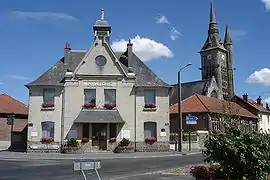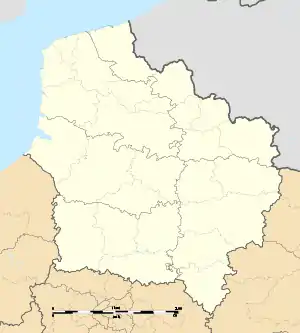Neuville-Saint-Vaast
Neuville-Saint-Vaast is a commune in the Pas-de-Calais department in the Hauts-de-France region of France. It is located 3.2 kilometres (2.0 mi) south of the Canadian National Vimy Memorial dedicated to the Battle of Vimy Ridge. The Memorial was built on Hill 145, the highest point of the ridge[2] to commemorate the battle and the Canadian soldiers who lost their lives during the First World War. The Memorial is also the site of the Canadian Cemetery No. 2, Neuville-St.-Vaast and Givenchy Road Canadian Cemetery, Neuville-St.-Vaast.[3][4]
Neuville-Saint-Vaast | |
|---|---|
 Town hall and the church | |
 Coat of arms | |
Location of Neuville-Saint-Vaast 
| |
 Neuville-Saint-Vaast  Neuville-Saint-Vaast | |
| Coordinates: 50°21′22″N 2°45′32″E | |
| Country | France |
| Region | Hauts-de-France |
| Department | Pas-de-Calais |
| Arrondissement | Arras |
| Canton | Arras-1 |
| Intercommunality | CU Arras |
| Government | |
| • Mayor (2008–2014) | Jean-Pierre Puchois |
| Area 1 | 12.59 km2 (4.86 sq mi) |
| Population (2017-01-01)[1] | 1,526 |
| • Density | 120/km2 (310/sq mi) |
| Time zone | UTC+01:00 (CET) |
| • Summer (DST) | UTC+02:00 (CEST) |
| INSEE/Postal code | 62609 /62580 |
| Elevation | 81–144 m (266–472 ft) (avg. 107 m or 351 ft) |
| 1 French Land Register data, which excludes lakes, ponds, glaciers > 1 km2 (0.386 sq mi or 247 acres) and river estuaries. | |
The Neuville-St Vaast German war cemetery (also called Maison Blanche) is the largest in France from WWI, with 44,833 buried here.[5]
Geography
Neuville-Saint-Vaast is situated 4 miles (6 km) north of Arras, at the junction of the D49 and D55 roads. The A26 autoroute passes through the commune. Vimy Ridge rises from Neuville-St.-Vaast to its high point at Hill 145 (the location of the Canadian Memorial), where there is a steep drop off.[4]
History
In World War I, Neuville-Saint-Vaast was the location of intense mining activity by the tunnelling companies of the Royal Engineers. In March 1916, the New Zealand Tunnelling Company relieved the French 7/1 compagnie d'ingénieurs territoriaux in the "Labyrinth" sector of the Western Front. The German "Labyrinth" stronghold was located near Neuville-Saint-Vaast, between Roclincourt and Écurie and not far from Notre Dame de Lorette.[6] On 29 March 1916, the New Zealand Tunnelling Company exchanged position with the 185th Tunnelling Company and moved to Roclincourt-Chantecler, a kilometre south of their old sector.[6] The 176th Tunnelling Company moved to Neuville-Saint-Vaast in April 1916 and remained there for a considerable time,[7] as did the 172nd Tunnelling Company, which was relieved at Neuville-Saint-Vaast by the 2nd Australian Tunnelling Company in May 1916.[7]
Population
| Year | Pop. | ±% p.a. |
|---|---|---|
| 1968 | 927 | — |
| 1975 | 973 | +0.69% |
| 1982 | 1,129 | +2.15% |
| 1990 | 1,295 | +1.73% |
| 1999 | 1,400 | +0.87% |
| 2007 | 1,477 | +0.67% |
| 2012 | 1,510 | +0.44% |
| 2017 | 1,526 | +0.21% |
| Source: INSEE[8] | ||
Places of interest
- The church of St.Laurent, rebuilt, as was all of the village, after World War I.
- The Commonwealth War Graves Commission cemeteries.
- The nearby Canadian National Vimy Memorial
- The war memorial
- Neuville-St Vaast German war cemetery

Notable people
- Henri Gaudier-Brzeska, sculptor, died in the fighting here on the 5 June 1915.
- François Hennebique, an inventor of reinforced concrete, was born here on the 26 April 1842.
See also
References
- "Populations légales 2017". INSEE. Retrieved 6 January 2020.
- http://www.veterans.gc.ca/eng/remembrance/memorials/overseas/first-world-war/france/vimy/fast-facts
- "Canadian National Vimy Memorial, France". The Great War UK. The Great War UK. 2015. Retrieved 31 March 2017.
The ridge runs in a direction from Givenchy-en-Gohelle in the north-west to Farbus in the south-east.
- http://www.greatwar.co.uk/french-flanders-artois/memorial-canadian-national-vimy-memorial.htm
- http://www.greatwar.co.uk/french-flanders-artois/cemetery-neuville-st-vaast-german.htm
- Byledbal, Anthony. "New Zealand Tunnelling Company: Chronology". Archived from the original on 6 July 2015. Retrieved 5 July 2015.
- "The Tunnelling Companies RE". The Long, Long Trail. Archived from the original on 10 May 2015. Retrieved 25 April 2015.
- Population en historique depuis 1968, INSEE
External links
| Wikimedia Commons has media related to Neuville-Saint-Vaast. |